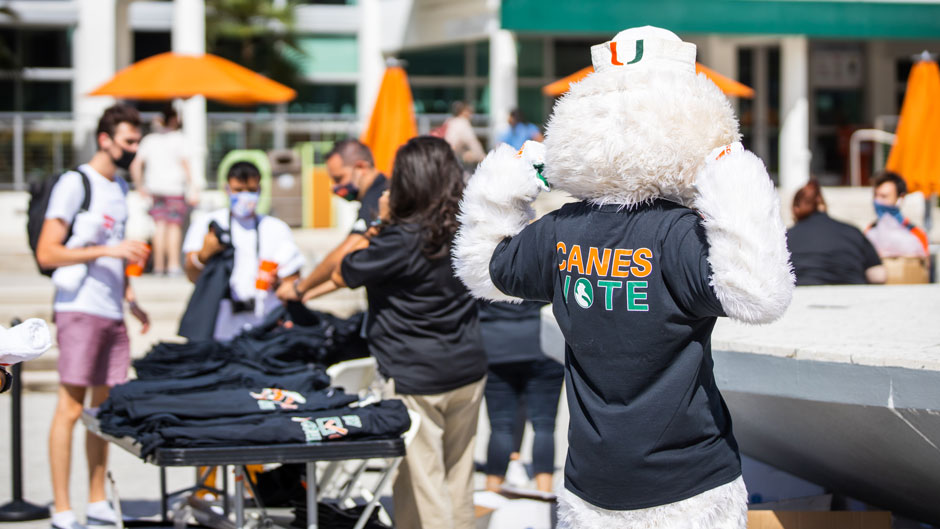Despite new challenges presented by the pandemic during the past year, the Butler Center for Service and Leadership managed to find innovative and unique ways to engage students to register and vote.
The department’s recent efforts have led to the University of Miami being designated a “Voter Friendly Campus” by the Fair Elections Center’s Campus Vote Project (CVP) and the National Association of Student Personnel Administrators (NASPA). The designation recognized 234 colleges and universities across the United States that developed, implemented, and reported results for engagement programs that encouraged their students to participate in the civic process.
Andrew Wiemer, director of the Butler Center, received direct support from the Division of Student Affairs to lead students and faculty and staff members on a mission to increase voter participation on campus. Together, the team increased the voter engagement efforts across the institution since 2008.
In 2016, the ’Canes Vote Network, a leadership coalition, was created to connect individuals across the University who all have the common passion to increase awareness and civic participation at the University. Get Out the Vote (GOTV) is a student led initiative under the Network’s umbrella that has dedicated countless hours to promoting non-partisan voter mobilization across campus.
“I’m very proud of our students who have taken amazing initiative throughout COVID-19 and been able to create—not only safe in-person events but digital events as well—voter engagement and participation on- and off-campus,” said Wiemer. “The students created a holistic approach to ensure we had initiative for our community.”
Cole Plominski, GOTV president-elect, said he is excited the University of Miami has gained this designation. In Fall 2020, the University of Miami ranked second in the nation in the Pledge to Vote campaign.
“Get Out the Vote has worked very hard over the past year to motivate our peers and educate them on voting during the pandemic” said Plominski, a junior political science major. “We plan to continue these efforts leading up to the midterm elections.”
Additional efforts like the Voter Ambassador Program, which 40 students and faculty and staff members were a part of in the fall, significantly increased voter registration and education on campus that semester. Ambassadors served as social media influencers who reached their target audience mostly virtually through email campaigns and webinars, as a means to engage and prevent the spread of COVID-19. This was a new tactic for the ambassadors that proved to be successful, because they reached more than 17,000 students during the Fall 2020 Semester—with Election Day falling on Nov. 3.
“I am overwhelmed with joy and I’m so proud of our students for being innovative in a time that we will most likely not experience again in terms of an election year,” said Wiemer. “Hopefully our students will be able to take what they learned and be able to infuse a digital component in the future of voter engagement on our campus,” he added.
The institutions who received the “Voter Friendly Campus” designation represent a diverse cohort of two-year, four-year, public, private, rural, and urban campuses. NASPA and the CVP both want to bolster efforts that help students overcome barriers to participating in the political process and develop a culture of democratic engagement on campus, according to their statement.

